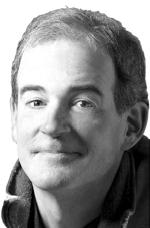
The company must have been on a gold rush. By 2015, it employed 800, with a market value of $9 billion. It was destined to be a shining example of work that began when Stanford dropout Elizabeth Holmes sold dreams based on a tiny droplet of blood.
It seemed to be one of those high-tech startup dreams cast in the glow of Silicon Valley.
Be careful what you wish for.
Prosecutors Monday will be out for blood in the case of Theranos and founder Elizabeth Holmes, who was 19 when she dropped out of Stanford in 2003. The case poses a classic question for anyone who has had visions of a stroke of luck turning into a life’s story. When was it no longer OK to go on promising a pot of gold that had pretty much dissolved into delusion by 2015?
If the founder actually believes his or her own star story, a case for fraud would be virtually impossible, since fraud is based on intent. What if the founder really believed it was only a matter of time — that given another six months, the company could have sprung from the ashes because the original flimsy promises turned out to be true?
A federal jury in San Jose will decide this fable of truth or consequences starting this week in a trial expected to run several weeks.
Elizabeth Holmes carried her own power supply — and the story that went with it. She dressed for success, always wearing a black turtleneck a-la-Steve Jobs. She attracted allies from David Boies, the noted trial lawyer, to Henry Kissinger, the ex-Nixon cabinet member.
Her story was simple. She was developing a machine that, using a pin-prick of blood instead of several vials full, would run a series of all-in-one blood tests, for sale at over-the-counter prices from outlets like Walgreens.
The yarn took a dozen years to fray, raising this central question: did Holmes know it was all a lie? Was she participating in a game that could defraud investors and consumers? Did she answer lawyers’ questions with “I don’t know” once too often?
Or was she always on the cusp on a discovery not quite ready for prime time? The blood tests she promised were riddled with problems, because her all-in-one machine didn’t perform as promised (though a model was available for inspection at the firm’s offices). The tests also weren’t run by Holmes’ technology, but outsourced to dozens of regular blood-test outfits instead.
The machine was the “most important thing humanity has ever built,” proclaimed Holmes, her voice carefully lowered as if for effect. Her company even pedaled the fiction that the U.S. Army was a customer.
The little bumps in the road to a company already worth billions began to attract doubters. One, John Carreyrou, stuck to documents and medical evidence. Writing for the Wall Street Journal, he concluded by 2015 that Theranos’ story and claims were largely fabricated. Holmes’ allies sought to get the story spiked, but legend has it that Rupert Murdoch, the press czar, decided to leave the decision to the editors. Carreyrou’s story went on sale as a book called “Bad Blood.”
The trial, involving billions of theoretical worth, will come down to whether jurors conclude Holmes came to know that her claims represented lies, or that she actually believed them even beyond the company’s crash in a liquidity and publicity crisis in 2015.
The odds don’t look good for Theranos and Holmes, but they are closely watched in the venture capital world, where the value of promises is traded. Many see value in holding onto fading dreams whose chance of becoming worthless is always above zero. They never stop “believing.”
The story line of the chance of going from scrap heap to riches on other people’s money has always been at the core of the Silicon Valley code. Odds are always thin for the success of a startup. And just as frequently, true success stories launch as dubious yarns.
“Fairy tales can come true,” Sinatra croons in “Young at Heart.” Thin odds are never quite dead. One such story line appeared in the trial TV series “Bull,” likely based on the Holmes story. In that case, the odds of failure never quite reach zero. The dream never dies, so the fat lady never appears.
Old business: My column last week about Ron Perelman’s pledge to Princeton for a new building there drew a request from Mr. Perelman. His attorney asked that we stress that Perelman did not opt out of his pledge, but that Princeton canceled it instead.
The writer (dukeofdanforth@gmail.com) is a founder of the Aspen Daily News and his column appears here Sundays.
"case" - Google News
September 05, 2021 at 05:00PM
https://ift.tt/38En2X7
Danforth: Elizabeth Holmes: A case of fraud or believing one’s own hype? - Aspen Daily News
"case" - Google News
https://ift.tt/37dicO5
Shoes Man Tutorial
Pos News Update
Meme Update
Korean Entertainment News
Japan News Update
Bagikan Berita Ini
















0 Response to "Danforth: Elizabeth Holmes: A case of fraud or believing one’s own hype? - Aspen Daily News"
Post a Comment